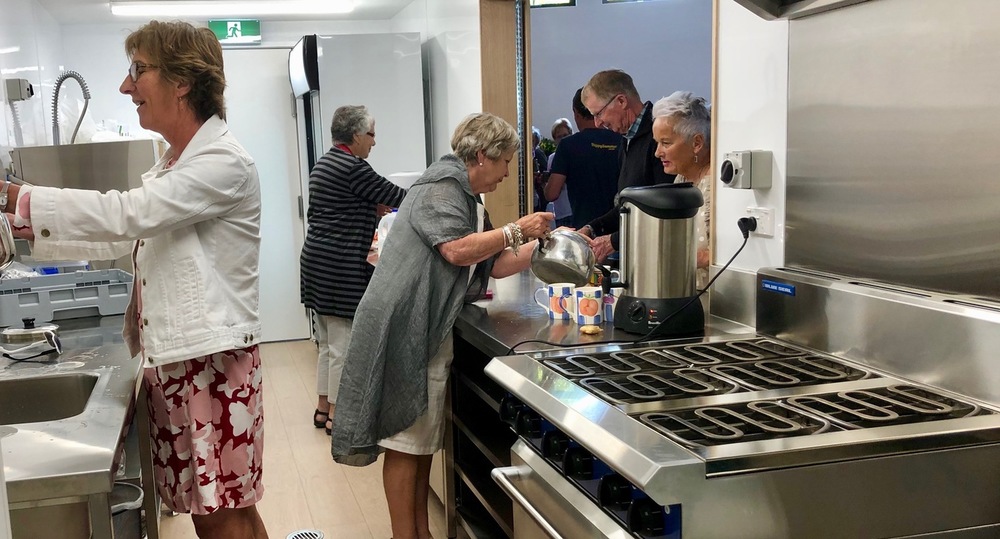Lessons to be learned from Community Hub funding
Sue Wards
31 March 2022, 5:06 PM
 Scenes at the hub opening in 2019.
Scenes at the hub opening in 2019.Lessons need to be learned from council’s involvement with the Wānaka Community Hub, members of the Wānaka Community Board (WCB) said yesterday (Thursday March 31).
The WCB unanimously agreed to convert a $500,000 loan from the Queenstown Lakes District Council (QLDC) to the Wānaka Community House Charitable Trust (WCHCT) to a grant at yesterday’s meeting.
The WCB also agreed to take the half million dollar grant from the dwindling Wānaka Reserve Asset Fund (WRAF).
Read more: Community Hub’s funding fate to be decided

The hub is home to a range of social services, and has meeting rooms, offices, an auditorium, and a commercial kitchen.
Councillor Quentin Smith said the process had been tough.
“I think we’ve learnt a lot of lessons from the very beginning, when council stood aside early on and said ‘we’ll see how this plays out’.
“It’s quite clear in community projects that council is a key stakeholder and should be involved in the design of the project from the very beginning.”
Quentin said it was a useful lesson to learn and council’s involvement would have “managed expectations around funding”.
The Wānaka Community Hub was developed by the WCHCT over an 18-year process.
Progress was beset by a range of obstacles, including community opposition to resource consents, funding challenges, and, most recently, tensions between the WCHCT and its anchor tenant, Community Networks.
A report withheld from the public at yesterday’s meeting apparently pointed to a much improved relationship between the two parties.
Councillor Niamh Shaw noted that council staff had reported both parties found the mediation process worthwhile and were “positive about working together in the future”.
Niamh also said it would be useful for the council to “debrief the process and communication around this project”.
She said the funding agreement between the WCHCT and the QLDC was “a relatively generic document which has the potential to provide more accountability”.
Her proposed amendment that once the WCHCT clears its outstanding debt, “it will prioritise community bookings over commercial bookings”, was approved by the rest of the board.
“I understand the tension between paying off outstanding debt while fulfilling this purpose. It’s a matter of trying to provide that extra little bit of accountability to the community,” she said.
“I appreciate that from a council perspective $500,000 is a relatively small amount, but from this community’s perspective that is a large amount to grant to a community organisation.”
Deputy mayor Calum MacLeod said conversation with QLDC regulatory and legal general manager Stewart Burns indicated that taking money from the WRAF was “basically the only option”.
“There is an option to go district wide but that is potentially setting a precedent,” Calum said.
“The intent has always been for a great asset and … I think we’ll end up with a great community asset. Let’s move on and hope both trusts can move forward and work hand in hand. It’s been a long process but will end up with a positive result.”
Ed Taylor was one of four board members who expressed reluctance to use the WRAF for the grant.
“It’s half a million dollars, not $20k. Other groups will be sitting around thinking they’ve got a good idea for a building,” he said.
However, when it came to a vote, only Quentin voted against the use of WRAF.
WCB member Jude Battson congratulated the WCHCT volunteers “who have done thousands of hours of work to get it to where it is” and to the “high calibre” trustees, who she said were “delighted” with the agenda item.
The $3.95M hub is home to a range of social services, including the food bank, and has two meeting rooms, a number of smaller offices, an auditorium which can seat up to 150 people, and a commercial kitchen.
PHOTOS: Wānaka App



